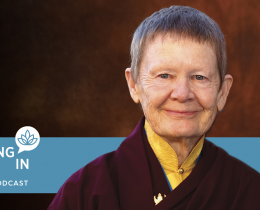Omega: Why did you start to combine mindfulness practices with the tools of cognitive therapy?
Zindel: It began with the growing realization that people who are dealing with a mood disorder need to learn ways of looking after themselves when they’re no longer in an acute episode of depression or anxiety. These disorders are recurrent, and they can sometimes develop into chronic disorders. I wanted to find a way of helping people prevent the return of symptoms that could help to break the cycle of recurrence and chronicity.
The work itself is derived from an understanding of the nature of mind and the vulnerability carried by people living with a mood disorder. The nature of mind for these people gets easily retriggered by moments or small drops in their mood, such as everyday life setbacks. For some people that vulnerability seemed to trigger a resurgence of ways of looking at themselves—judging, evaluating, being very harsh and critical—that could bring back a more negative mood and other symptoms.
Omega: How can someone tell the difference between “being in a mood” versus dealing with a mood disorder?
Zindel: We all have the capacity to feel sad. It's a part of this wonderful landscape of emotions that we can experience—emotions that enrich our lives and make them vibrant. But for some people, it becomes a lot more than just a temporary sadness. Certain moods tend to stay, and they bring with them other symptoms, including changes in appetite and problems with sleep and fatigue.
If those changes—including a low mood and the loss of the ability to enjoy things—stick around for between two weeks to a month, and if they really get in the way of people being able to function in their ordinary lives, then it's probable that something has changed and the person needs to consider getting some care or treatment because it might be more of a mood disorder and less of a normal fluctuation in mood.
Omega: You have conducted research that shows how certain people are more vulnerable than others to developing depression and experiencing recurrent episodes. What do those people share in common?
Zindel: Each episode of depression is thought to increase the risk of a future episode by about 16 percent. So if you've had four episodes, that's a 64 percent of risk of having another one. But that doesn't really tell us about the person; it's just a statistic.
Not surprisingly, we see a higher incidence of depression in people who’ve suffered trauma in their lives, especially early childhood trauma, as well as in people who are isolated and have an impoverished network of social connections. Men tend to be less affected than women—the ratio is around 66 to 34 percent women to men. Depression is also associated with a number of other conditions, such as alcohol and substance abuse.
If you're talking about the general population, the onset of depression can occur in a bimodal way where sometimes onsets are seen early in life— around late teens or early 20s—or people sail through life without being depressed and then get depressed in their 60s. We see two peaks.
Omega: In The Mindful Way Through Depression, you discuss how people who have been seriously depressed in the past are more likely to feel bad about themselves when they notice a dip in mood as opposed to those who have never dealt with depression. Can you characterize those negative thinking patterns?
Zindel: Everyone faces setbacks in life. You get a tax bill that you didn't anticipate or someone turns you down for a job or you have an argument with someone that you feel close to. These are things that we all need to find ways of regulating.
If people have had a history of depression, it's more likely that they will jump to very global conclusions about themselves and ways of thinking that are reminiscent of when the depression was present. They might start to judge or blame themselves. They might start to feel that they're inadequate and not good enough. They might start to feel that they'll never be good enough, that things are hopeless, and they don't have a future.
Those kinds of global conclusions from small setbacks leave people in a difficult place, unsure how to cope or what to do next. They can feel like they have a limited set of choices or actions available to them.
Omega: What are some of the tools that can make those vulnerable people more resilient to depression?
Zindel: The first thing that people need to do is get treatment. Unfortunately, depression is still stigmatized. If a person had high blood pressure, they wouldn't think twice about going to see a physician and getting some kind of medication to regulate it. But people who are depressed often don't go for treatment because they feel like depression is not a disease. They often perceive it as an inadequacy—they think they're not good enough, not trying hard enough, or not pushing themselves hard enough. It's hard sometimes to see the symptoms of depression as part of a disease or a disorder rather than as personal failings.
Luckily, depression responds to treatment. There is solid evidence for many different things that people can do for themselves. Exercise can increase oxygenation levels in the brain and has been shown to be an effective anti-depressant. Going for walks in nature has also been shown to have an impact on working memory and other cognitive capacities. Yoga, or some kind of mindful movement, can be very effective. You don't have to run a four-minute mile—even walking and light exercise helps to put you in a different frame of mind.
Practicing mindfulness allows people to work with their emotions more wisely. People who are depressed often experience a variety of different emotions, not just depression. Sometimes anxiety will show up as well. Being able to work with your emotions means avoiding reactive reflexive patterns of responding when you feel a certain way. If you overeat or get angry at your partner reflexively, you want to create some space from your emotions so you can choose how you might want to react in a given moment. This is where mindfulness can help—it works with you on a moment-by-moment basis.



